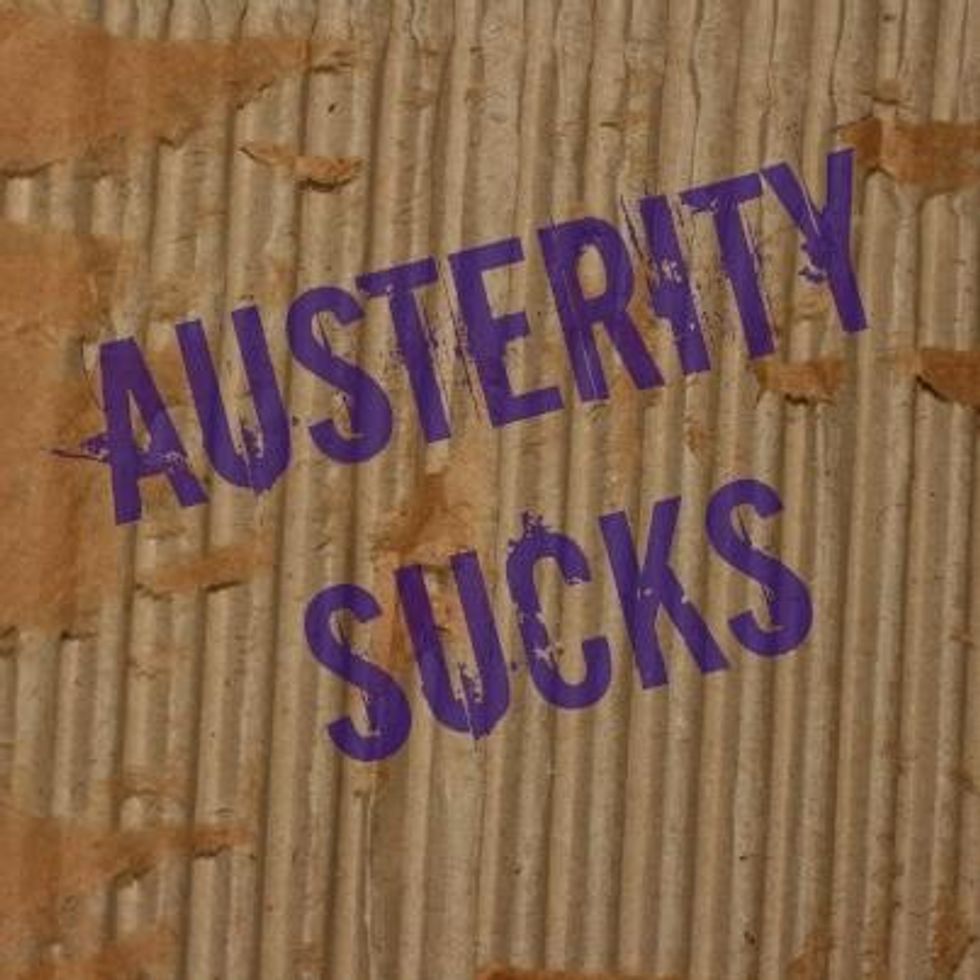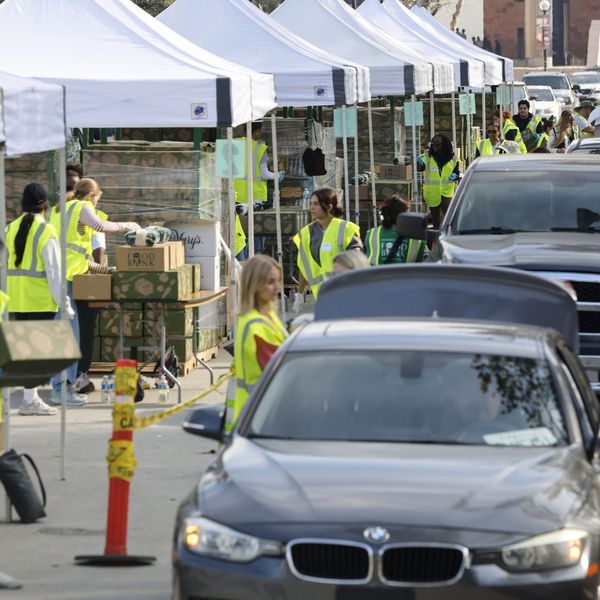Austerity Is 'Suffocating the Economy'
The US economy is suffering from a nasty case of austerity.

Only 165,000 new jobs were created in April--far fewer than is needed to address existing unemployment and to create positions for the millions of Americans who are entering the workforce.
More than 11.7 million active job seekers cannot find work. And that figure does not include millions of Americans who have given up on looking for work, or who are severely under-employed. Add them in and the real unemployment's at 13.9 percent.
Even the jobs that are being created tend to be in sectors of the economy where wages tend to low and benefits often nonexistent. For instance, the latest report notes growth in the "temporary services" sector. But there's zero job growth in manufacturing.
"This is a classic 'hold-steady' report --enough job growth to keep the unemployment rate stable but not much more," Heidi Shierholz, an economist with the Economic Policy Institute, says of the latest news from the US Department of Labor. "In good times, this would be fine, but at a time like this, it represents an ongoing disaster."
Why are things so slow?
In a word: austerity.
"This month's abysmal jobs number--165,000 new jobs in April, barely enough to cover new people coming into workforce--is a self-inflicted wound. Government austerity--(misguided tax policies) and spending cuts--is suffocating the economy, just when it needs air," explains Robert Borosage, the co-director of the Campaign for America's Future. "And the perversity will get worse. The sequester cuts are only now beginning to hit. Austerity is driving Europe deeper into recession. China is slowing. US exports will suffer. And Washington is about to descend into new self-manufactured crises around next year's budget and the debt ceiling. The positive signs in housing, the extraordinary measures taken by the Federal Reserve, the soaring stock market are undermined by Washington's failure."
Congress cannot even agree on the problem. Despite the fact that their approach has been discredited--academically and practically--there are still members of the House and Senate who buy into the fantasy that what's holding the economy back is government spending. Typical is Senator Ron Johnson, R-Wisconsin, who says, "To get the economy moving and generate real, self-sustaining job creation, we need to limit spending and reject more tax increases."
In fact, the government should be targeting investments to spur job growth. As Dean Baker, the co-director of the Center for Economic and Policy Research, says, "Unless the government takes steps to boost growth, we will be seeing millions of people needlessly denied employment for over a decade. That should be the central focus of everyone in Washington."
The immediate threat is posed by sequester cuts--following a classic austerity model. As they are implemented, the Congressional Budget Office projects, growth will be reduced by 0.5 percent, costing as many as 700,000 jobs. Congressman Mark Pocan, a Wisconsin Democrat who has emerged as a key player in the Congressional Progressive Cause, says the House and Senate need to "pass a budget that ends the job-killing sequester cuts for everyone--not just the well-connected-- and makes investments in job-creating programs such as infrastructure, education, and research and development."
Pocan's got the right answers. Unfortunately, there are too many politicians in Washington who have yet to start asking the right questions about how austerity is strangling economic recovery.
An Urgent Message From Our Co-Founder
Dear Common Dreams reader, The U.S. is on a fast track to authoritarianism like nothing I've ever seen. Meanwhile, corporate news outlets are utterly capitulating to Trump, twisting their coverage to avoid drawing his ire while lining up to stuff cash in his pockets. That's why I believe that Common Dreams is doing the best and most consequential reporting that we've ever done. Our small but mighty team is a progressive reporting powerhouse, covering the news every day that the corporate media never will. Our mission has always been simple: To inform. To inspire. And to ignite change for the common good. Now here's the key piece that I want all our readers to understand: None of this would be possible without your financial support. That's not just some fundraising cliche. It's the absolute and literal truth. We don't accept corporate advertising and never will. We don't have a paywall because we don't think people should be blocked from critical news based on their ability to pay. Everything we do is funded by the donations of readers like you. Will you donate now to help power the nonprofit, independent reporting of Common Dreams? Thank you for being a vital member of our community. Together, we can keep independent journalism alive when it’s needed most. - Craig Brown, Co-founder |
The US economy is suffering from a nasty case of austerity.

Only 165,000 new jobs were created in April--far fewer than is needed to address existing unemployment and to create positions for the millions of Americans who are entering the workforce.
More than 11.7 million active job seekers cannot find work. And that figure does not include millions of Americans who have given up on looking for work, or who are severely under-employed. Add them in and the real unemployment's at 13.9 percent.
Even the jobs that are being created tend to be in sectors of the economy where wages tend to low and benefits often nonexistent. For instance, the latest report notes growth in the "temporary services" sector. But there's zero job growth in manufacturing.
"This is a classic 'hold-steady' report --enough job growth to keep the unemployment rate stable but not much more," Heidi Shierholz, an economist with the Economic Policy Institute, says of the latest news from the US Department of Labor. "In good times, this would be fine, but at a time like this, it represents an ongoing disaster."
Why are things so slow?
In a word: austerity.
"This month's abysmal jobs number--165,000 new jobs in April, barely enough to cover new people coming into workforce--is a self-inflicted wound. Government austerity--(misguided tax policies) and spending cuts--is suffocating the economy, just when it needs air," explains Robert Borosage, the co-director of the Campaign for America's Future. "And the perversity will get worse. The sequester cuts are only now beginning to hit. Austerity is driving Europe deeper into recession. China is slowing. US exports will suffer. And Washington is about to descend into new self-manufactured crises around next year's budget and the debt ceiling. The positive signs in housing, the extraordinary measures taken by the Federal Reserve, the soaring stock market are undermined by Washington's failure."
Congress cannot even agree on the problem. Despite the fact that their approach has been discredited--academically and practically--there are still members of the House and Senate who buy into the fantasy that what's holding the economy back is government spending. Typical is Senator Ron Johnson, R-Wisconsin, who says, "To get the economy moving and generate real, self-sustaining job creation, we need to limit spending and reject more tax increases."
In fact, the government should be targeting investments to spur job growth. As Dean Baker, the co-director of the Center for Economic and Policy Research, says, "Unless the government takes steps to boost growth, we will be seeing millions of people needlessly denied employment for over a decade. That should be the central focus of everyone in Washington."
The immediate threat is posed by sequester cuts--following a classic austerity model. As they are implemented, the Congressional Budget Office projects, growth will be reduced by 0.5 percent, costing as many as 700,000 jobs. Congressman Mark Pocan, a Wisconsin Democrat who has emerged as a key player in the Congressional Progressive Cause, says the House and Senate need to "pass a budget that ends the job-killing sequester cuts for everyone--not just the well-connected-- and makes investments in job-creating programs such as infrastructure, education, and research and development."
Pocan's got the right answers. Unfortunately, there are too many politicians in Washington who have yet to start asking the right questions about how austerity is strangling economic recovery.
The US economy is suffering from a nasty case of austerity.

Only 165,000 new jobs were created in April--far fewer than is needed to address existing unemployment and to create positions for the millions of Americans who are entering the workforce.
More than 11.7 million active job seekers cannot find work. And that figure does not include millions of Americans who have given up on looking for work, or who are severely under-employed. Add them in and the real unemployment's at 13.9 percent.
Even the jobs that are being created tend to be in sectors of the economy where wages tend to low and benefits often nonexistent. For instance, the latest report notes growth in the "temporary services" sector. But there's zero job growth in manufacturing.
"This is a classic 'hold-steady' report --enough job growth to keep the unemployment rate stable but not much more," Heidi Shierholz, an economist with the Economic Policy Institute, says of the latest news from the US Department of Labor. "In good times, this would be fine, but at a time like this, it represents an ongoing disaster."
Why are things so slow?
In a word: austerity.
"This month's abysmal jobs number--165,000 new jobs in April, barely enough to cover new people coming into workforce--is a self-inflicted wound. Government austerity--(misguided tax policies) and spending cuts--is suffocating the economy, just when it needs air," explains Robert Borosage, the co-director of the Campaign for America's Future. "And the perversity will get worse. The sequester cuts are only now beginning to hit. Austerity is driving Europe deeper into recession. China is slowing. US exports will suffer. And Washington is about to descend into new self-manufactured crises around next year's budget and the debt ceiling. The positive signs in housing, the extraordinary measures taken by the Federal Reserve, the soaring stock market are undermined by Washington's failure."
Congress cannot even agree on the problem. Despite the fact that their approach has been discredited--academically and practically--there are still members of the House and Senate who buy into the fantasy that what's holding the economy back is government spending. Typical is Senator Ron Johnson, R-Wisconsin, who says, "To get the economy moving and generate real, self-sustaining job creation, we need to limit spending and reject more tax increases."
In fact, the government should be targeting investments to spur job growth. As Dean Baker, the co-director of the Center for Economic and Policy Research, says, "Unless the government takes steps to boost growth, we will be seeing millions of people needlessly denied employment for over a decade. That should be the central focus of everyone in Washington."
The immediate threat is posed by sequester cuts--following a classic austerity model. As they are implemented, the Congressional Budget Office projects, growth will be reduced by 0.5 percent, costing as many as 700,000 jobs. Congressman Mark Pocan, a Wisconsin Democrat who has emerged as a key player in the Congressional Progressive Cause, says the House and Senate need to "pass a budget that ends the job-killing sequester cuts for everyone--not just the well-connected-- and makes investments in job-creating programs such as infrastructure, education, and research and development."
Pocan's got the right answers. Unfortunately, there are too many politicians in Washington who have yet to start asking the right questions about how austerity is strangling economic recovery.

